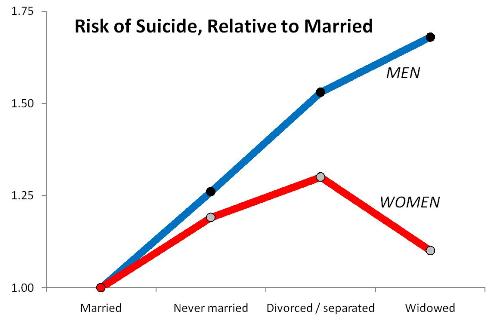
Who needs marriage? When it comes to suicide, at least, the answer is: "men."
Jessie Bernard famously argued that every marriage is really two marriages, his and hers - and his was more beneficial than hers. We know, for example, that both men and women have more family income when they're married, but that's mostly because men earn more than women, and married men earn more than single men. We know that women often depend on marriage for their health insurance, because men's jobs are much more likely to provide coverage. The recent debate about women's reportedly-declining happiness highlights the slipperiness of subjective indicators of well-being.
Sociologists have always considered suicide to be the gold standard measure of psychological wellbeing. And marriage has historically been a key indicator of social integration, the source of belongingness that makes suicide less likely. Although Bernard believed that, with regard to suicide, marriage is more protective of men than of women, recent research has been more equivocal. Now, however, we have a good long-term study with a large U.S. sample that tests this, and finds that, as suspected, marriage protects men more than women from themselves.

Source: My figure from Table 2 in Richard Rogers, Patrick Krueger and Tim Wadsworth, "Adult Suicide Mortality in the United States," Social Science Quarterly, 2009 (90[5]:1167-85).
Controlling for race, age and the number of people in the family, those in marriage relationships have the lowest risk of suicide from 1986 through 2002 (these are called hazard ratios). But the pattern is only statistically significant for men, and it's much more pronounced. The authors offer reasonable explanations for this:
Marital status--particularly widowhood--is significantly associated with the risk of suicide among males but not among females. These findings are compatible with prior research that suggests that marriage confers greater health benefits for men than for women, potentially because women invest more time and energy than other household members caring for the health and well-being of children, husbands, and older family members. In turn, men are especially vulnerable to the risk of suicide when they lose that social support due to widowhood.
Cross-posted from the Family Inequality blog.